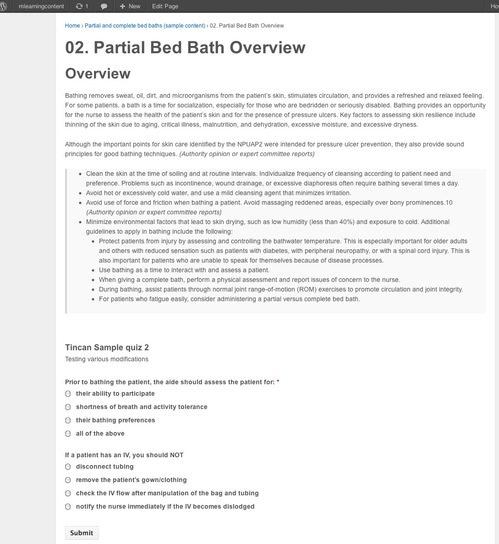I work in a small learning management department in a large Health System. One of the "forever" problems we'd like to solve, is how to get out of the way of our many clinical subject matter experts and make it EASY for them to put trackable learning content online by themselves. Why is this still a problem in this age of online applications? Simply put: cost, learning curve and trackability.
Licensing costs in a decentralized environment
Software license costs are a big issue in a distributed authoring environment, particularly for departments that watch every penny. There are hundreds of potential authors out there, mostly in departments that do not prioritize the purchase of elearning software. Licenses for the big elearning software packages (Articulate, Storyline, Lectora, etc.) are not inexpensive, even with academic discounts and whatever site-licenses may exist.
Ads by Google
Posted by ellen at April 28, 2013 03:46 PM
Learning curves=diminishing returns curves
The learning curve of such packages is also an obstacle, because it is really another kind of expense: for our purposes, learning curves should be called diminishing-returns curves. A time-commitment to learning a new application may be worthwhile for an author who expects to use a tool many times, but too great for a busy SME who will only create learning content infrequently.
All the specialized authoring tools - even the easier ones - have a lengthy ramp-up period for novice users, with many details to keep track of and "insider" knowledge to acquire, which given the realities of a clinician's job and the value of their time is simply too expensive.
Even basic skills like file-management can be problematic because of the realities of a corporate environment where laptops and desktop systems are re-imaged frequently, and shared drive space is not available for large files. Key supporting files go missing, versions are confused or corrupted, embedded audio goes awry and there are never any backups. Many of the SMEs I've worked with have had to remap drives several times over the course of a year, losing the thread of a project in the process and requiring re-training to get started again.
For these reasons I've been looking for the holy grail of authoring tools at the intersection of "web-based", "free" and "drop-dead simple" for a fairly narrow use case: SMEs that want to create mostly text-based, low-interactivity training, with a short multiple-choice quiz to address a short-term local training need.
I've looked at all the content management offerings available within the organization, and settled on Wordpress for its ease of use for novice users. The usability of any CMS depends in large part on how it is configured, and its governance. We'll keep it extremely simple and focused until we understand better how people tend to use it.
Tracking: the final frontier
Perhaps the biggest feature content management systems have lacked in the past was the ability to track learning. With the advent of the TinCanAPI (xAPI), I think that piece is now in place. A few months ago, Next Software Solutions came out with a plugin for WordPress called the GrassBlade - xAPI Companion. This plugin tracks WordPress page views, and allows uploaded TinCan-enabled Articulate, Lectora or similar content to send data back to the LRS of your choice.
When the GrassBlade plugin came out I asked Pankaj Agrawal of Next Software to consider designing a plugin to track WordPress-native quizzes to close the loop and eliminate the need to use any external software package for assessment. I suggested Gravity Forms quizzes as the basis, again for ease-of-use and extensive feature set and support.
Not only did he consider it, but it is now in Beta and works very well! Pankaj added a TinCan statement viewer for quick reports, and I believe may add more extensive reporting features in later releases. The first Nurse-SME that tried it created her own quiz after literally 5 minutes of instruction!
The hardest part of the whole project was connecting WordPress up to our LDAP, so learners can log in with their real identity. I'll providing details in another post on what we did to make LDAP work with Wordpress on Windows Server/IIS, and what remains to be done to get it to work with CoSign, our single-sign-on solution.
The WordPress content can be used for reference when not logged in but the quizzes only show up when the user is signed in. Once they log in and take a quiz, all interaction data including page views, choices, scores, etc. is sent to the LRS. Gravity Forms also provides its own reports on the quiz results within WordPress.
Still remaining to do is the design of an navigation scheme for the learning content, and a pilot test. We will also be adding an integration with our LMS, probably sending only completion data to the user's transcript.
For more information about the new GrassBlade Gravity Forms Addon wordpress plugin, contact Pankaj Agrawal:
Email: contact@nextsoftwaresolutions.com
Below is a screenshot of a sample WordPress quiz.

Resources
- Email Next Software: contact@nextsoftwaresolutions.com
- Next Software Contact Page: http://www.nextsoftwaresolutions.com/contact-us/
- GrassBlade xAPI companion plugin (upload and track externally created xAPI content in Wordpress)
Ads by Google